 Cleanzine: your weekly cleaning and hygiene industry newsletter 18th April 2024 Issue no. 1110
Cleanzine: your weekly cleaning and hygiene industry newsletter 18th April 2024 Issue no. 1110
Your industry news - first
The original and best - for over 20 years!
We strongly recommend viewing Cleanzine full size in your web browser. Click our masthead above to visit our website version.
Innovation in the bag
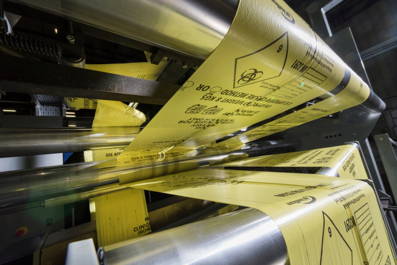 To the uninitiated, the manufacture of refuse sacks may seem straightforward. However, for those with a mission to develop the strongest, most cost-effective product from recycled polythene, innovation is essential.
To the uninitiated, the manufacture of refuse sacks may seem straightforward. However, for those with a mission to develop the strongest, most cost-effective product from recycled polythene, innovation is essential.
Three decades ago, recycling was a niche activity. The first bottle bank had only just been launched and, although green advocates eagerly separated paper for recycling, even the most ardent recyclers - scrap metal merchants, were yet to think of themselves as part of a vibrant, budding new movement... the recycling industry.
However, one company that was ahead of the curve with recycling even then, has been working hard ever since to innovate, improve, and to encourage customers and suppliers to couple quality products with environmental performance.
RPC bpi refuse is a UK processor with four manufacturing sites, producing over 30 million refuse sacks from used agricultural film each week. It is also the largest recycler of polythene waste in Europe and a major player within the burgeoning circular economy.
What singles RPC bpi refuse out from many other businesses aiming for circularity is its closed loop system. Every stage of the process is managed in-house; the company owns and operates the recycling plants, as well as manufacturing end products from its own sites.
The polythene used to make the company's award winning Green Sack range of refuse sacks is made from recycled British farm waste plastics. The farm waste plastic is recycled at one of two specially designed plants operated by RPC bpi recycled products and is the only legal outlet for farmers in the UK.
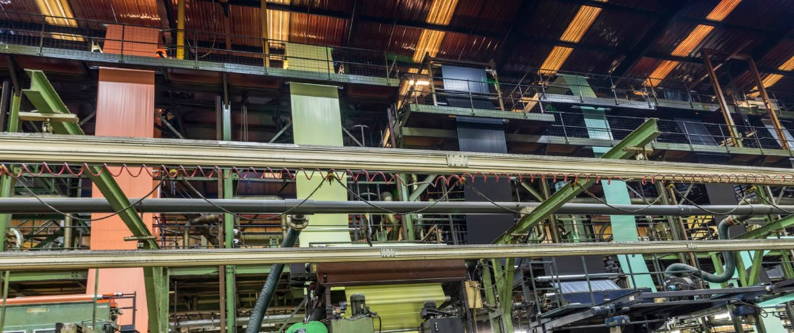 The finished product has a carbon footprint of at least 35% less than any other refuse sack in the UK. Already the most tear-resistant option on the market, the latest version - Green Sack Fusion, is multi-layered for superior strength, high tear and puncture resistance. The sacks have been made even stronger by combining triple layer extrusion technology with a new core layer formulation made from super strength waste polythene.
The finished product has a carbon footprint of at least 35% less than any other refuse sack in the UK. Already the most tear-resistant option on the market, the latest version - Green Sack Fusion, is multi-layered for superior strength, high tear and puncture resistance. The sacks have been made even stronger by combining triple layer extrusion technology with a new core layer formulation made from super strength waste polythene.
For many recycled materials, creating a genuine end product has proved problematic and, over the last 10 years or so, investment has been leveraged into kick-starting markets for everything from plastic milk bottles to compost. RPC bpi refuse, on the other hand, started with a viable market and built its business model around supplying its own material for that process.
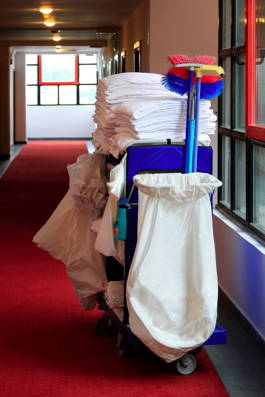 The Green Sack range, which is widely used throughout the facilities management, food service and janitorial sectors, is accompanied by a wider refuse range and healthcare portfolio, which includes sacks designed for local authorities, hospitals, retail and builders' merchants.
The Green Sack range, which is widely used throughout the facilities management, food service and janitorial sectors, is accompanied by a wider refuse range and healthcare portfolio, which includes sacks designed for local authorities, hospitals, retail and builders' merchants.
Meanwhile, the Synthesene Bi-Modal sack was designed to provide a cost-effective option for kerbside collections, but is now also being used successfully in the FM sector, when a lightweight but tough sack is called for.
The stats in favour of recycling polythene are formidable. Each tonne recycled saves 1.8 tonnes of crude oil, reduces energy use by two thirds and cuts nitrous oxide emissions in half. It also prevents the release of 1.5 tonnes of CO2 compared to using prime polythene.
However, in 2015, 70% of polythene waste in Europe was still not recovered for recycling. RPC bpi refuse is always on the lookout for new sources of waste polythene; retaining material in the UK for recycling not only reduces the environmental impact generated by transport and saved manufacturing costs, but also guarantees that the material is diverted from landfill or incineration.
RPC bpi refuse is accredited to ISO: 14001, ISO: 9001:2008, and OHSAS: 18001. It recently achieved Zero Waste to Landfill certification at three of its four manufacturing sites across the UK, becoming one of only a small number of companies in the UK to produce a finished product from recycled material, with zero waste to landfill in the process.
The company's refuse sacks have also been certified to CHSA (Cleaning & Hygiene Suppliers Association) standards. The CHSA represents all the major manufacturers and distributors which supply cleaning and hygiene products in the UK. Certification ensures that products conform to the highest industry standards - for example, that 'heavy duty' sacks really fulfill their claim. New members are audited four times throughout their first year, and at least twice annually thereafter.
Sales Director, Lorcan Mekitarian described such developments as central to the company's ethos: "We have, as always, been at the forefront with cutting edge technologies and plant, and accreditation offers external evaluation and an independent benchmark to measure ourselves against.
"We support operations with an extensive, ongoing £multi-million capital investment programme, while our facilities house some of the most advanced equipment in the world.
"As a UK recycling and manufacturing company competing with the traditional export model, it's very important that we lead the way, in terms of both quality and environmental performance.
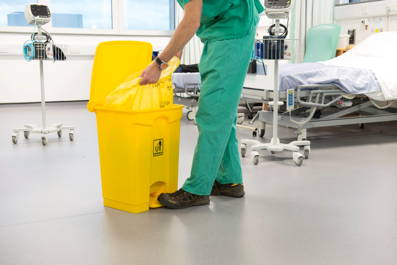 "We are always thinking about the next step. Working across so many areas, we have plenty of scope to propel the business on to the next innovation or technology. We might be searching for new waste streams to make new products from recycled materials, driving down product costs, or improving product performance, but our goal is always the same - to optimise processes to manufacture the best quality product.
"We are always thinking about the next step. Working across so many areas, we have plenty of scope to propel the business on to the next innovation or technology. We might be searching for new waste streams to make new products from recycled materials, driving down product costs, or improving product performance, but our goal is always the same - to optimise processes to manufacture the best quality product.
"Our environmental credentials are a high priority, and we invest heavily in recycling, but there would be no point if the actual product was not fit for purpose."
RPC bpi refuse currently runs the world's largest Intarema recycling line, which was commissioned in 2015. It has also designed the first wash plant for reprocessing contaminated distribution centre waste.
Used polythene - and particularly farm waste - is one of the most difficult materials to recycle because of the high levels of contamination that often occur. Up to 60% of incoming material can be tainted with soil, sand, and even stones, which must be rinsed in the washing plant.
Cleaned plastics are chopped, heated and melted into pellets in the recycling area, which boasts one of the largest recycling machines in Europe. An extruder then melts pellets before they are dyed and manufactured into film. Finally, the extruded plastic film is taken to the bag conversion hall where it is turned into a bag: the bottom is sealed, a perforation is created at the top for a tie, and the bag is wound onto a roll ready for packing and distribution.
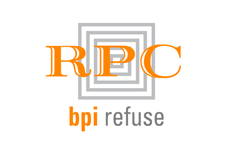 The new Intarema line, film extruder and conversion unit, which is faster and more efficient than its predecessor, were all introduced as part of RPC bpi refuse's latest three-year strategy to invest in new processes and technology.
The new Intarema line, film extruder and conversion unit, which is faster and more efficient than its predecessor, were all introduced as part of RPC bpi refuse's latest three-year strategy to invest in new processes and technology.
Lorcan Mekitarian says the company has no intention of slowing down: "We see ourselves very much as pioneers, and innovation sits at the heart of that vision. Our products need to be tough and resilient, while our processes reflect our commitment to the most rigorous environmental standards.
"We are not satisfied to follow trends; we are determined to drive the business models of the future, and our forward view consists of exceptional products manufactured with as little environmental impact as possible."
26th January 2017







